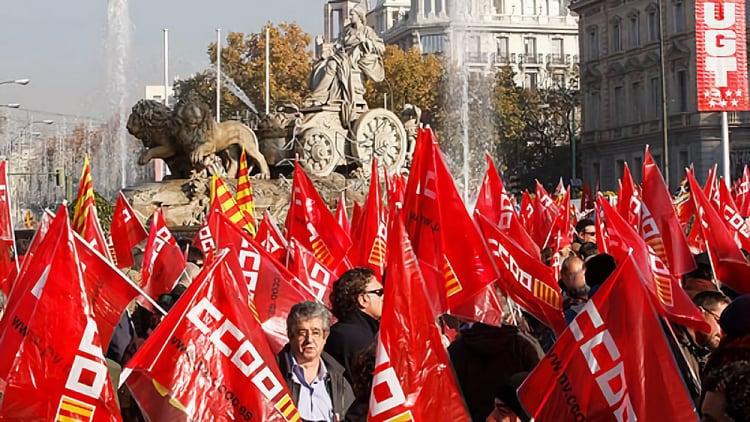Ángel Collado
The left-wing trade unions, “class” as they like to call themselves, have entered the campaign to demonstrate their support for the government of Pedro Sánchez, a cabinet that, in turn, assumes the principles of economic policy defended by Comisiones Obreras (CC.OO) and the Unión General de Trabajadores (UGT).
The coalition government of socialists and populists boasts of having achieved “social peace” with its commitment to public spending, the rise in pensions, the 47 per cent increase in the minimum wage and the new labour legislation that gives more power to the unions.
Sánchez is about to become the first Spanish prime minister to whom the trade unions have not called a general strike. All his predecessors, from Adolfo Suárez in 1978 to Mariano Rajoy in 2018, with socialists Felipe González and José Luis Rodríguez Zapatero in between, had to face mobilisations by official workers’ representatives.
All the heads of government in the last 40 years, whether centre-right (UCD and PP) or PSOE, dared or were forced to undertake far-reaching economic reforms, in terms of pensions or labour legislation, which led to strikes and mass protests.
The current idyll between the executive branch and the trade unions, reflected in the celebrations of 1 May, has been extended by the prominence of the vice-president for Social Affairs, Sánchez’s liaison with the trade unions and charged by her boss with uniting the entire populist far left around the coalition government in order to remain in power: Yolanda Díaz.
Neither inflation in general nor the skyrocketing energy prices for more than a year, with the consequent loss of purchasing power for workers, have moved the unions to confront the government to demand solutions. Only in the last few weeks, in view of the imminent electoral cycle with the local elections on 28 May and the general elections at the end of the year, have Comisiones Obreras and UGT begun to threaten strikes, but against employers and to demand wage rises.
Díaz, a labour lawyer by profession and more than sympathetic to CC. OO., has implemented all her star measures in agreement with the trade unions and with the employers’ representatives’ backs turned. She gave back to the trade unions the power they had lost in collective bargaining negotiations with the reform of the last PP government, created the peculiar figure of the “permanent discontinuous” worker to reduce unemployment in the official statistics and signed up to the increase in the Minimum Interprofessional Wage in line with trade union demands.
When Sánchez took over the government in the motion of censure presented with all the left and the independentistas in 2018, the SMI was at 858 euros per month. Since then, and always in agreement with the unions, Díaz has been raising it annually to the current 1,080 euros, despite complaints from employers.
The generosity of the left-wing coalition cabinet with the trade unions has also been evident in the chapter on subsidies. From the 8.8 million euros they received in the last financial year of the PP (2018) they have gone to 17 in the most recent call last April. In four years of Sanchez’s government, they will receive 56.6 million compared to the 21 million received under the governments of Mariano Rajoy.
Sánchez’s “social peace” is also based on the support of the class unions for his “non-reform” of the pension system: the promise to maintain automatic rises according to the inflation index and the increase in contributions without taking into account the deficit of the system. The government only sought agreement with its trade union allies and is pushing through the changes with its back to half of the parliament, business organisations and the self-employed.
For the president of the government and Díaz, it is now a perfect fit for their respective campaigns, the former for his personal re-election race and the latter to launch the Sumar platform, the trade union mobilisation against the employers.
Sánchez and his vice-president are cultivating their more left-wing image with an anti-business and even anti-capitalist discourse already tested against the big employers’ association, the CEOE, or large specific companies such as Ferrovial. In the coming weeks, the government and trade union message will focus on blaming all the ills of the economy on the employers’ resistance to wage increases.







